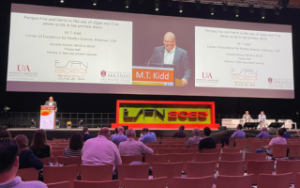
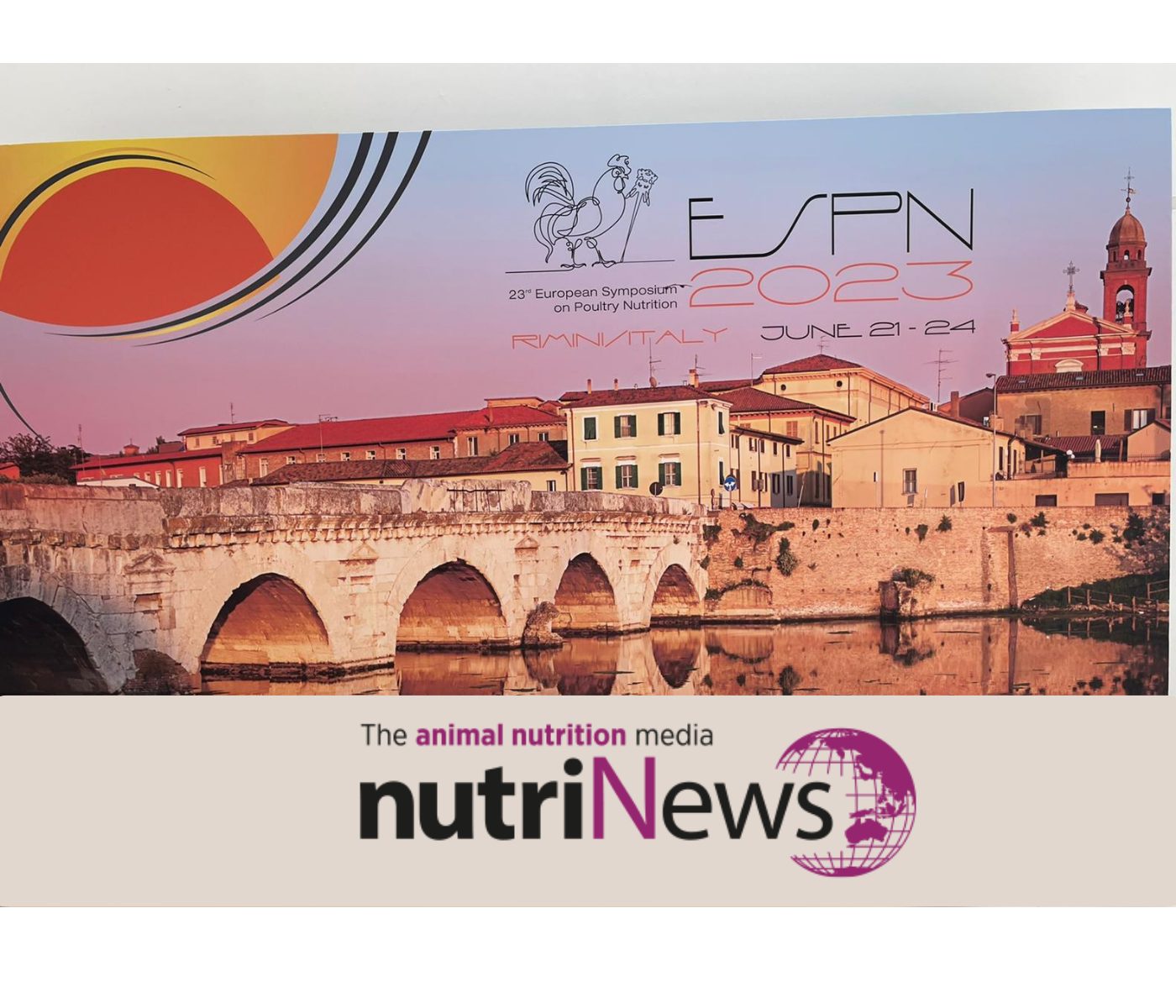 28 Jun 2023
28 Jun 2023
The 23rd European Symposium on Poultry Nutrition (ESPN 2023) took place from June 21st to 24th, 2023 at the Palacongressi di Rimini in Italy. Organized by the Italian Branch of the World’s Poultry Science Association, this symposium served as a significant platform for the exchange of information regarding poultry nutrition in Europe. Regarded as one of the most influential gatherings in the field worldwide, it provided a unique opportunity to showcase scientific and technical achievements in poultry nutrition and foster discussions with leading poultry scientists.

Selected Notable Lectures from the Symposium
One of the keynote speakers at the conference was Emily Burton, hailing from the Poultry Research Unit at Nottingham Trent University in the UK. Her lecture focused on “The Role of Nutrition in Supporting Sustainable Poultry Production.” Burton highlighted that poultry nutrition has been a prominent research field for almost a century, leading to the establishment of poultry as the most efficient protein source among animals. From the 1940s to the 1990s, significant progress was made in understanding the requirements for vitamins, amino acids, and minerals, based on the concept of apparent metabolizable energy. The investigation of exogenous enzymes during the 1980s further contributed to enhanced digestion in poultry. This accumulated knowledge has not only enabled meeting the nutritional needs of poultry but has also played a crucial role in achieving global food security goals.
In parallel to the advancements in poultry nutrition, researchers have been grappling with the challenge of reconciling economic growth with ecological degradation. The concept of sustainable development, defined as meeting present needs without compromising the ability of future generations to meet their own needs, has emerged as a potential solution. Sustainable development was extensively discussed at the symposium, with a focus on climate change, economic development, and global goals that can contribute to its realization.
Another notable lecture was presented by Fifi Zaefarian from the School of Agriculture and Environment at Massey University in New Zealand. Zaefarian’s lecture, titled “Improving Energy Utilization in Poultry: Challenges and Opportunities,” shed light on the importance of accurate evaluation of dietary energy content and its impact on feed formulations and bird growth. Different energy systems have been proposed over the years, including apparent metabolizable energy (AME), N-corrected AME (AMEn), net energy (NE), and true ileal digestible energy (TIDE). Each system has its merits and drawbacks, but AMEn is widely used as the default value for expressing the available energy of feed ingredients and determining energy requirements for birds.
Zaefarian discussed the challenges faced by poultry nutritionists when using energy values of feed ingredients, such as the wide variability among published data and the influence of factors like methodologies, bird age, genotype, feed form, ingredient characteristics, and anti-nutritional factors. To improve energy utilization, the application of feed additives such as exogenous enzymes, emulsifiers, prebiotics, and probiotics has shown positive effects on nutrient digestibility.
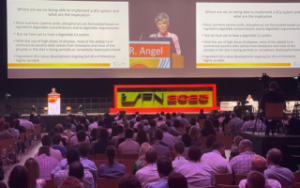
The lecture titled “Sustainability as Related to Optimal Mineral Nutrition” was presented by Roselina Angel, from the University of Maryland and Neuro Livestock Research in South Africa. Their talk emphasized the importance of understanding calcium (Ca) requirements, digestibility of Ca in ingredients, and their impacts on phosphorus (P) and micromineral digestibility. The dephosphorylation of phytic acid or its salt (phytate) plays a crucial role in optimizing dietary P, copper (Cu), and zinc (Zn) utilization. By managing Ca supply in the diet, the digestion and absorption of microminerals and P can be improved, resulting in decreased excretion.
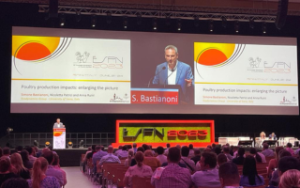
Simone Bastianoni, from the Ecodynamics Group at the University of Siena presented a lecture titled “Poultry Production Impacts: Enlarging the Picture.” Bastianoni focused on the need to minimize the environmental impact of the poultry industry in light of increasing global population and meat demand. He introduced an Input-State-Output (I-S-O) framework to represent the cause-effect relationships and interactions among the environment, society, and the economy. This holistic approach aimed to highlight the interdependencies and feedback loops between these three components of sustainability.
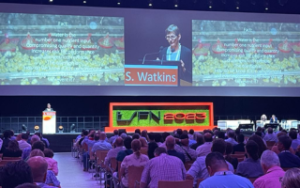 Susan E. Watkins from the Center of Excellence for Poultry Science at the University of Arkansas delivered a lecture on “Observations on Water Quality and Quantity for Poultry.” She emphasized the significance of water as the primary nutrient input in poultry production. Despite its relatively low cost compared to other requirements, water quality has received limited research attention. Watkins highlighted the need for water management programs that monitor and control both quality and quantity parameters. Understanding the unique characteristics of water supplies and implementing tailored action plans are crucial for ensuring acceptable standards and supporting cost-efficient performance in poultry operations.
Susan E. Watkins from the Center of Excellence for Poultry Science at the University of Arkansas delivered a lecture on “Observations on Water Quality and Quantity for Poultry.” She emphasized the significance of water as the primary nutrient input in poultry production. Despite its relatively low cost compared to other requirements, water quality has received limited research attention. Watkins highlighted the need for water management programs that monitor and control both quality and quantity parameters. Understanding the unique characteristics of water supplies and implementing tailored action plans are crucial for ensuring acceptable standards and supporting cost-efficient performance in poultry operations.
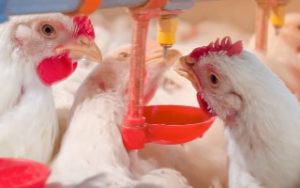
 Edgar Orlando Oviedo-Rondón from the Prestage Department of Poultry Science at North Carolina State University presented a lecture titled “NUTRITIONAL AND FEEDING STRATEGIES FOR ANTIBIOTIC-FREE POULTRY PRODUCTION.” Focusing on the global trend of antibiotic-free (ABF) poultry production,Dr. Oviedo discussed the various motivations behind this shift, such a:
Edgar Orlando Oviedo-Rondón from the Prestage Department of Poultry Science at North Carolina State University presented a lecture titled “NUTRITIONAL AND FEEDING STRATEGIES FOR ANTIBIOTIC-FREE POULTRY PRODUCTION.” Focusing on the global trend of antibiotic-free (ABF) poultry production,Dr. Oviedo discussed the various motivations behind this shift, such a:
While successful ABF production has been achieved by some poultry companies, there remains a productivity gap compared to conventional systems with antibiotic growth-promoters. Bridging this gap and achieving comparable productivity, health, and environmental outcomes in ABF systems continue to pose challenges for many producers.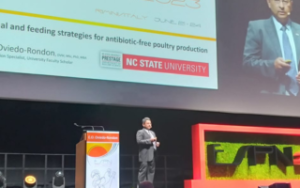
Recap
The ESPN 2023 symposium provided an invaluable platform for the exchange of knowledge and ideas regarding poultry nutrition in Europe.The symposium covered a wide range of topics, including:
Keynote lectures delivered by experts from various universities and research institutions highlighted the significant role of nutrition in supporting sustainable poultry production. Over the years, extensive research in poultry nutrition has not only allowed meeting the nutritional needs of poultry but has also contributed to achieving global food security goals. The symposium underscored the importance of reconciling economic growth with ecological sustainability, with discussions revolving around climate change, economic development, and global goals related to sustainable development.
Several lectures focused on specific aspects of poultry nutrition, such as energy utilization, mineral nutrition, water quality, and digestive dynamics. These presentations emphasized the challenges faced by poultry nutritionists, including the variability in published data, the influence of various factors on energy values and nutrient digestibility, and the need for tailored strategies and management approaches to optimize nutrition and production outcomes.
Furthermore, the symposium shed light on emerging trends and developments in poultry nutrition, such as the growing interest in antibiotic-free production, the interplay between non-starch polysaccharides and fiber, and the exploration of alternative protein sources like microalgae and insects. These innovative approaches and research directions aim to improve the efficiency, sustainability, and environmental impact of poultry production.

Perspective and limits in the use of algae and free amino acids in low protein diets – M.T. Kidd (Usa)
Final remarks
Overall, the ESPN 2023 symposium provided a valuable platform for sharing scientific and technical achievements in poultry nutrition, fostering collaboration and knowledge exchange, and addressing the pressing challenges faced by the industry. The insights gained from this symposium will undoubtedly contribute to the advancement of poultry nutrition and support the development of sustainable and efficient practices in the field.

NutriNews International and our esteemed technical director, Dr. Edgar Oviedo, were delighted to participate in this remarkable event. We actively engaged in knowledge sharing, meaningful discussions, and comprehensive coverage of the symposium, reaffirming our commitment to advancing animal nutrition research and promoting enhanced production for global food security. Having Edgar Oviedo present at this significant gathering further emphasized our dedication to supporting the development and dissemination of valuable insights in the field of poultry nutrition.
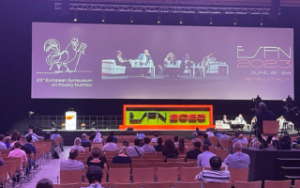
We hope you have enjoyed our coverage of this great event, and we really look forward to connecting with you again in the near future!
Subscribe now to the technical magazine of animal nutrition
AUTHORS

Nutritional Interventions to Improve Fertility in Male Broiler Breeders
Edgar Oviedo
The Use of Organic Acids in Poultry: A Natural Path to Health and Productivity
M. Naeem
Synergistic Benefits of Prebiotics and Probiotics in Poultry, Swine, and Cattle
Gustavo Adolfo Quintana-Ospina
Hybrid Rye Potential in Laying Hen Feed Rations
Gwendolyn Jones
A day in the life of phosphorus in pigs: Part I
Rafael Duran Giménez-Rico
Use of enzymes in diets for ruminants
Braulio de la Calle Campos
Minerals and Hoof Health in the Pregnant Sow
Juan Gabriel Espino
Impact of Oxidized Fats on Swine Reproduction and Offspring
Maria Alejandra Perez Alvarado